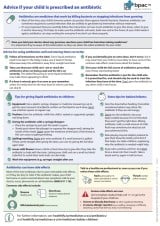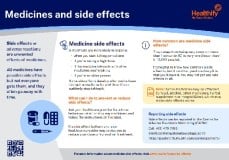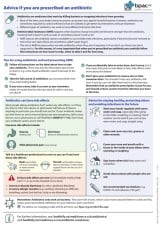You can now add Healthify as a preferred source on Google. Click here to see us when you search Google.
Benzathine penicillin
Sounds like 'ben-zah-theen pen-ih-sil-in'
Key points about benzathine penicillin
- Benzathine penicillin is an antibiotic used to treat bacterial infections such as rheumatic fever and syphilis.
- Benzathine penicillin is also called Bicillin LA®.
- Find out how it is given and possible side effects.

Benzathine penicillin (also called Bicillin LA) is an antibiotic used to treat bacterial infections such as rheumatic fever and syphilis. It is also given to prevent conditions like rheumatic fever and poststreptococcal glomerulonephritis (a form of kidney inflammation).
Benzathine penicillin works by killing or stopping the growth of bacteria (bugs). It belongs to a group of antibiotics called penicillins. Like all antibiotics, benzathine penicillin is not effective against infections caused by viruses. Benzathine penicillin is available as an injection that is given into a muscle.
A doctor or a nurse will give you this medicine. Tell them if you've ever had an allergic reaction to penicillin or any other medicine.
- Injection site: Benzathine penicillin is given by injecting it into a large muscle in your buttock (bottom) in adults and older children, or in the thigh (infants and small children). This is called an intramuscular injection.
- Pain relief: Benzathine penicillin is sometimes given with a local anaesthetic to relieve discomfort during the injection. If you have allergies to local anaesthetics tell your doctor or nurse.
- Number of doses: Some people may need 2 doses, which is given as 1 injection into each buttock at the same visit. Some people only need to have benzathine penicillin once, but others will need to come back for more doses every few weeks, or complete a course of treatment. Ask your doctor or nurse what the plan is for you and your condition.
- After your injection: After receiving your injection, you will be asked to wait in the clinic for 15 minutes. If you have any reaction following treatment (eg, a rash, itchiness or breathing difficulties), please tell a staff member immediately.
Like all medicines, benzathine penicillin can cause side effects, although not everyone gets them. If you're concerned about any symptoms you think might be related to your medicine, talk to your healthcare provider. The following information offers some guidance but doesn't include all possible side effects.
Common side effects
Tell your healthcare provider if these side effects bother you.
- Pain, redness, swelling or soreness at the injection site: Place a cold, wet cloth or ice pack where the injection was given. Leave it on for a short time.
- Fever, chills, headache or fatigue: This may occur within a few hours after treatment of early syphilis, although not everyone will have this reaction. Don’t be alarmed – this is not an allergic response and usually ends in 24 hours. You can take paracetamol or ibuprofen to help relieve symptoms. This reaction rarely occurs after treatment of late syphilis.
- Diarrhoea (runny poo): Drink plenty of fluids such as water to avoid dehydration. Tell your healthcare provider if it becomes severe or contains blood. If you have diarrhoea and you’re also taking the oral contraceptive pill, let your healthcare provider or pharmacist know.
- Nausea (feeling sick): This should settle after a few days.
Phone 111 for an ambulance or go to your nearest accident and emergency (A&E) clinic if these occur
- Signs of an allergic reaction such as itchy skin, and rash, swollen lips or tongue, problems breathing, like a tight chest or shortness of breath. A trained healthcare provider will observe you for at least 15 minutes after being given the injection but if these symptoms develop after that, go straight to the emergency department at your nearest hospital.
Read more about medicines and side effects and reporting a reaction you think might be a side effect.
Brochures
Advice if you are prescribed an antibiotic(external link) BPAC, NZ, 2024
Advice if your child is prescribed an antibiotic(external link) BPAC, NZ, 2024
Medicines and side effects(external link) Healthify He Puna Waiora, NZ, 2024
5 questions to ask about your medications(external link) Health Quality and Safety Commission, NZ, 2019 English(external link), te reo Māori(external link)
References
- Benzathine penicillin(external link) NZ Formulary
- Stop sore throats(external link) Health New Zealand | Te Whatu Ora
Brochures

Advice if your child is prescribed an antibiotic
BPAC, NZ, 2024

Medicines and side effects
Healthify He Puna Waiora, NZ, 2024
Credits: Sandra Ponen, Pharmacist, Healthify He Puna Waiora. Healthify is brought to you by Health Navigator Charitable Trust.
Reviewed by: Angela Lambie, Pharmacist, Auckland
Last reviewed:
Page last updated:






